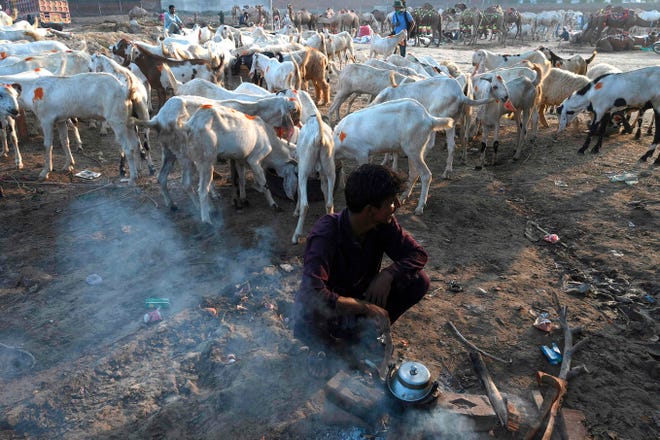![[USA TODAY]What it is and how it will be celebrated amid COVID-19 [USA TODAY]What it is and how it will be celebrated amid COVID-19](https://www.gannett-cdn.com/presto/2020/07/29/USAT/8f7dae1b-28e0-4582-97ea-1e5dcba15001-AP_Eid_Al_Adha_Photo_Gallery.jpg?width=660&height=434&fit=crop&format=pjpg&auto=webp)
![[USA TODAY]What it is and how it will be celebrated amid COVID-19 [USA TODAY]What it is and how it will be celebrated amid COVID-19](https://www.gannett-cdn.com/presto/2020/07/29/USAT/8f7dae1b-28e0-4582-97ea-1e5dcba15001-AP_Eid_Al_Adha_Photo_Gallery.jpg?width=660&height=434&fit=crop&format=pjpg&auto=webp)
Muslims around the globe this week will celebrate Eid al-Adha in the age of social distancing.
Eid al-Adha is Arabic for “festival of sacrifice” and is the second of two major Muslim holidays (the other being Eid al-Fitr). It is the holiday that marks the end of the hajj season, or pilgrimage season, said Omid Safi, professor of Islamic studies at Duke University.
Eid al-Adha is – under usual circumstances – a joyous holiday and an opportunity for Muslim families and communities to gather for prayers and feasts.
Eid is a three-day celebration in Muslim-majority countries. In the United States, most observe just one day.
Elections:Joe Biden vows to abolish ‘vile’ Muslim travel ban on Day 1 if elected president
During the ongoing coronavirus pandemic, which has infected more than 16 million people worldwide, celebrations might look a bit different.
Here’s what to know about Eid al-Adha:

The meaning of ‘al-Adha’
“Al-Adha” refers to sacrifice, specifically the “one in which Abraham was asked – as a test – by God to sacrifice his son, only to have God intervene and substitute a ram (or lamb) instead,” Safi said.
The sacrifice as depicted in the Quran (the Islamic holy text) has similarities to what’s in the Bible, though in the Quran, Abraham is asked by God to sacrifice his son Ishmael, not Isaac.
In present-day, animals, typically goats, lambs or cows, are still sacrificed to mark the occasion. The meat from the animals sacrificed is shared with the community and food banks areas where there are impoverished or food-insecure Muslims, said Anna Bigelow, associate professor of religious studies at Stanford University.

Safi said for many poor Muslims, Eid al-Adha marks an occasion where they receive meat.
He added, “Since the notion of sacrifice initially referred to sacrificing that which is precious (thus the test of offering one’s child to God), there is a longstanding Muslim tradition of taking the sacrifice at the symbolic level, implying that the real sacrifice is not the killing of an animal, but rather sacrificing one’s own egoistical desires.”
How is Eid al-Adha celebrated?
This year, Eid al-Adha will be observed starting the evening of July 30 and ending August 3.
How Eid al-Adha is observed depends on where it is being celebrated, Bigelow said.
“For a lot of Muslims in the U.S., this may not mean sacrificing an animal themselves,” Bigelow said. “Most American Muslims will sponsor the sacrifice to occur elsewhere. The meat and other products of the death of the animal are then dedicated to charitable purposes.”
When is Eid al-Fitr? Muslims to celebrate one of the biggest holy festivals amid coronavirus
In other areas, a family may actually take in an animal and perform the sacrifice themselves in a place where it’s possible to do so hygienically.
“In locals where the sacrifice occurs, people gather, they have meals together, they often exchange the meat among their households and neighbors and family. In some cultures, they’ll divide it in particular portions around the neighborhood.”
There’s also a special prayer held the morning of Eid.
Will it be different amid coronavirus?
Eid al-Adha comes at the end of the hajj season, and this year Saudi Arabia suspended travel to Mecca amid the ongoing coronavirus pandemic. Muslims worldwide mark the end of the season with Eid al-Adha.
“There’s that monumental moment when as many Muslims as possible – sometimes up to 3 million – will travel to and perform the pilgrimage in the present-day kingdom of Saudi Arabia,” Bigelow said.
Bigelow said many gatherings will take place online this year, a far cry from an events where entire communities would gather in places like football stadiums. In 2018, US Bank Stadium in Minnesota – home of the NFL’s Minnesota Vikings – held “Super Eid,” which drew 30,000 people, according to the Star Tribune of Minneapolis.
In Muslim-minority communities, celebrations like Eid al-Adha are “essential” for community building, Bigelow said. She compared scaled back celebrations to changes during Easter – the Christian holiday was drastically impacted by the pandemic.
“For Muslim Americans, there’s a particular sadness around not being able, for the most part, to have the same kinds of gatherings they would have celebrated and enjoyed.”
Everything is a bit “up in the air” in terms of celebration this year, Safi said. Some on social media are donating to causes in lieu of traditional sacrifices, he said.
How is it different from Eid al-Fitr?
Eid al-Fitr, which is Arabic for “festival of the breaking of the fast,” marks the end of Ramadan. Eid al-Fitr is the first of the two Eids.
And Eid Mubarak?
That’s not a festival, but a greeting. It means, “Have a blessed Eid.”
Contributing: Fatima Farha, USA TODAY
![[The Hindu]Lok Sabha 2024: INDIA bloc has always been anti-development, says Modi in Wardha [The Hindu]Lok Sabha 2024: INDIA bloc has always been anti-development, says Modi in Wardha](https://www.thehindu.com/theme/images/th-online/1x1_spacer.png)
![[Indian Express]Supplier of ‘aatank’ now struggling for ‘aata’: Modi takes dig at Pakistan [Indian Express]Supplier of ‘aatank’ now struggling for ‘aata’: Modi takes dig at Pakistan](https://data.indianexpress.com/election2019/track_1x1.jpg)

![[Daily Excelsior]BJP Did Not Field Candidates In 3 LS Seats In Kashmir As It Could Not Win People's Hearts: Omar [Daily Excelsior]BJP Did Not Field Candidates In 3 LS Seats In Kashmir As It Could Not Win People's Hearts: Omar](https://cdndailyexcelsior.b-cdn.net/wp-content/uploads/2024/04/OMAR-26-696x417.jpg)
![[The Northlines]Returning Officer Stands In Queue To Cast His Vote In J&K’s Udhampur [The Northlines]Returning Officer Stands In Queue To Cast His Vote In J&K’s Udhampur](https://thenorthlines.com/wp-content/uploads/2024/04/GLgj3C1XEAAAtp0-1024x768-1-1.jpg)
![[The Guardian]Middle East crisis live: G7 is ‘committed to de-escalating’, says Blinken as Iran official says no plan for immediate retaliation against Israel [The Guardian]Middle East crisis live: G7 is ‘committed to de-escalating’, says Blinken as Iran official says no plan for immediate retaliation against Israel](https://pakistannewsupdates.com/wp-content/uploads/2024/04/The-GuardianMiddle-East-crisis-live-G7-is-‘committed-to-de-escalating.jpg)
![[NDTV]PCB Likely To Announce New Pakistan Head Coach By This Date | Cricket News [NDTV]PCB Likely To Announce New Pakistan Head Coach By This Date | Cricket News](https://c.ndtvimg.com/2024-04/126mkino_pakistan-cricket-team-afp_625x300_19_April_24.jpg?im=FeatureCrop,algorithm=dnn,width=1200,height=675)
![[Times of India] A country supplying 'aatank' now struggling for 'aata': PM Modi's jibe at Pakistan | India News – Times of India [Times of India] A country supplying 'aatank' now struggling for 'aata': PM Modi's jibe at Pakistan | India News – Times of India](https://static.toiimg.com/photo/msid-109436739,imgsize-1309330.cms)
![[The Northlines]57.09% Polling Recorded Till 3 PM In J&K’s Udhampur Lok Sabha Seat [The Northlines]57.09% Polling Recorded Till 3 PM In J&K’s Udhampur Lok Sabha Seat](https://thenorthlines.com/wp-content/uploads/2024/04/glhty6rxmaaexvl2809706962011295707-846x1024.jpg)
![[Independent]By striking inside Iran, Irael has shown it’s prepared for escalation – Analysis [Independent]By striking inside Iran, Irael has shown it’s prepared for escalation – Analysis](https://static.independent.co.uk/static-assets/images/newsletter/breaking-news/breaking-news-thumb.png)
![[Rising Kashmir]Two labourers die after falling into trench in Kulgam village [Rising Kashmir]Two labourers die after falling into trench in Kulgam village](https://img.risingkashmir.com/wp-content/uploads/2024/04/19163040/images-2024-04-19T162942.209.jpeg)
![[Time]Ally of Pakistan Prime Minister Demands End to Ban of X [Time]Ally of Pakistan Prime Minister Demands End to Ban of X](https://api.time.com/wp-content/uploads/2024/04/AP24110311253851.jpg?quality=85&w=1200&h=628&crop=1)

